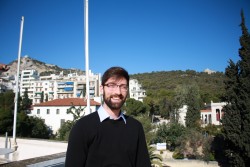Meet a Member: Bill Beck

Bill Beck is a Regular Member at the American School of Classical Studies at Athens getting his Ph.D. in Classical Studies at the University of Pennsylvania.
Q: What is your academic area of interest?
A: I’m always led to the same questions about the representations of time and causation in narrative, and right now I’m looking at how time and causation are represented in the Iliad. I think these are always important considerations for narrative literature, but especially for a war narrative, like the Iliad. Narratives establish causal sequences through time, and wars have a way of attracting everyone to give their take on the cause of a war (as if there’s ever a satisfactory answer to that), so I find the Iliad refreshing in its causal complexity and in its general refusal to establish straightforward causal relationships.
I’m usually drawn to long-form narratives because I think they present different (and for me, really interesting) kinds of problems to a narrator that short-form doesn’t. One of these problems is how to capture a moment in time in a sequential art form like epic poetry--especially the Iliad, which covers about two months. When we watch movies or TV, we take the passage of time for granted: when a scene changes, it usually doesn’t matter if we know whether three days or six days have elapsed between scenes. But the Iliad is different: every single moment is accounted for.
Q: What brings you to the American School?
A: I’m very much a philologist and that’s why I’m here. I did the summer session in 2010 and it was amazing. Then I want to grad school and only took philology seminars. The discipline is so vast and there’s so much you want to know-- and are expected to know--and not enough time to do it all. The American School is just a perfect way for me to fill in a lot of gaps that I neglected for a long time.
Q: Are you enjoying focusing on archaeology for a little while?
A: I love it. I’m just really enjoying being exposed to so many new things and absorbing as much as I can. There’s a lot I don’t know and there’s a lot out there that I didn’t even know could be known. But probably more importantly, it’s given me a whole new framework for approaching the ancient world and the texts I study and teach.
Q: What was the most interesting site report that you gave?
A: My report on the battles at Sphacteria. First, because it involved an interesting passage from Thucydides, but it was also fun to do because it’s generated a ton of scholarly debate around problems that are actually total non-problems. I find that a lot with the Homeric scholarship I work with. I pay a lot of attention to the analysts, which is a branch of scholars from the 19th and early 20th centuries, and they created a lot of “problems” (because that’s what critics do) and then these “problems” take on a life of their own, and it often takes the next generation of scholars to come to terms with the wrongheaded assumptions those critiques were based on.

Beck impersonating a goddess figurine that was found at the site of Kavousi Vronda.
Q: What is your favorite place you’ve visited in Greece?
A: Thasos was amazing. Apart from Aegina, I hadn’t gotten to any of the islands when I was here in 2010 and my report was on the Parian colonization of the island, so I had more context for there than elsewhere.
Q: What is your favorite restaurant in Athens?
A: The bouzouki place in Peristeri called Kresento. I had no idea what I was in for. I thought I was going to a Sunday brunch but we stayed for hours.
Q: If you were a Greek god or goddess which one would you be?
A: Hermes because he’s itinerant and because he’s really great at avoiding conflict.
Q: Is there anywhere else you would like to visit in Greece?
A: All of the islands. I’ve been to Crete and Aegina, and now Thasos, but there’s just so much out there. And I think it would be very different from the stuff I’ve been seeing on the mainland.
Q: What do you get from your experience at the ASCSA?
A: Everything. I think the best part is the community and the culture—that you get to spend so much time with all of your colleagues, who are all also your friends, and just absorb the material at all times—at lunch, at dinner, on site, in the library. It creates a kind of culture that people yearn for in graduate school—this immersive culture where everyone is into what they’re studying and people are excited about it. The ASCSA has a really great community, and I feel really fortunate to be a part of it.